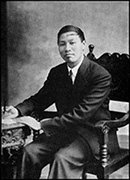"Independence" - aka - Having God without God
The Waterhole Blog

Independence Day is a big deal in America. Most countries have some sort of national day which celebrates their liberation from another power, or the restoration of self-determination. Canada has Canada Day, Germany has Der Tag der deutschen Einheit - Reunification, Mexico has Grito de Dolores - independence from Spain, Holland has Bevrijdingsdag celebrating the Liberation from the Nazis, and the list goes on.
Most of us in western cultures consider being independent to be a good thing. Teenagers can't wait to turn 18 so that they can do what they want. Being independent and being "your own boss" are things most people long for. And I'm not saying that these things aren't good in their place and time.
But unfortunately this western mentality carries over into our relationship with God. We want God (at least, those of us who have truly discovered him do), but rarely at the price of our independence. We'll add God to our list of ideas, concepts, and beliefs that we hold dear, but only very gradually will we let him have the say over what we think, say and do.
In time, many of us have come to call him our Lord and Master. And yet, in practice, we maintain control. We want the steering wheel to be in our hands.
Am I being too severe? I know that there are many, if not most, who struggle with sin. Each of us has one thing or another that we know is wrong, yet we find we cannot move past it, can't get control of it. For some it is because they don't want to deal with it. They don't want to admit that it is wrong and live by the Spirit of God. Often however, the problem is far more difficult, because they are not yet free to live as God wants.
Regardless, I'd like to lay these issues aside for a moment and focus in on two issues:
- how our independence mentality affects our relationship with God
- how our independence mentality affects our corporate relationship with God, ie., church life
1. Keeping God at a Distance
There is a time honored and effective way to have God in your life without letting him become too intrusive, ie., remain independent. It is called "Religion." Religion is very effective. It lets you maintain a very good feeling about yourself because it provides you with a list of things to perform.
Some religious traditions are full of ritual, which functions like a script, telling you when to sit or stand, which words to say and when to say them. It takes responsibility away from you and onto the system. If you play by the system's rules and follow the script, you are in. You are safe. You have pleased God. Or so you think.
Other religious traditions emphasize principles, rules and laws. You have freedom to sit, stand and speak as you wish, you may sing contemporary music and pray extemporaneously, but there are certain rules that regulate your behavior which you have to follow.

This is very practical. If you can read, you can find out what is expected of you. If you can hear, you can listen to a preacher explain it. Now that sounds really good. If something is expected of me, I like to know what it is, so that I can do it right.
There are rules of behavior in the Bible. The 10 Commandments and the law of Moses would be one example. Most Christians I know (and Jews too, if religious) orient themselves towards these moral commandments. I tend to do it myself, if I'm not careful. In reading the Scriptures we can see what God is like, see what pleases him, read what he said about what Israel should do and not do. Then we try to live accordingly.
Most churches utilize a combination of the two. Do you know what is ingenious about living your religious life this way? You can be a Christian, you can be saved, and still not have much if any daily contact with God himself.
I am writing tongue-in-cheek, it's true. But I am very serious. There are at least 3 major problems with trying to live in this religious way.
- It leads to incredible frustration, because you are trying to live a standard of holy perfection without the power to do so.
- You are fully capable of living this way without having any real contact with the true and living God, or at least trying to live this way. So in a sense, you are have God in your life, without really knowing him or rubbing shoulders with him daily.
- It was never God's intention for us to live this way.
The Mount Sinai Trap
Most people fall into the same trap that Israel fell headlong into as they experienced the overwhelming power and supernatural display of God at Mount Sinai, the day that God spoke audibly to the assembled nation and gave them the Ten Commandments.
Can you take a moment to put yourself in the shoes of an Israelite who has just fled Egypt with Moses?
You weren't an especially religious person. Mostly you were just trying to survive your scintillating life as a slave. Suddenly this Moses shows up and does his light and power routine in the capital city which eventually results in Pharaoh telling you all to get out of his sight as quick as possible.
Suddenly you and all your neighbors are refugees. No one asked you if you wanted to go. Though on the other hand, the alternative, to remain a slave, isn't especially inviting.
You are living in the heat of the desert. You know that the food is rationed and there is a perpetual water shortage. Your feet are already blistered and sore, and you know the journey has just begun.
Then Pharaoh changes his mind and sends his army after you to bring you all back. Moses does some of his magic and then expects everyone to follow him into a watery tunnel with waves backed up on both sides in order to cross the Gulf of Aqaba. If it weren't for the army rushing up behind you, you'd probably have Moses committed for suggesting such a thing.

After several narrow escapes where food and provision almost run out, the whole caravan arrives at a smoking and burning mountain, a holy mountain that Moses says will be the death of you if you walk on it or even touch it. There is a huge dark cloud covering the whole area, tons of fire and smoke and lightning crowns the peak.
There is a majestic pause and then a disembodied voice begins to speak, so loudly that millions of people can hear, yet somehow echoing inside of you as if the voice were speaking intimately with you alone.
- I am Y'hovah your God.
- You will have no other gods before me. You will not make any graven images.
- You are not to misrepresent my Name, my Person.
- You will observe the seventh day as set apart.
- Honor your parents.
- You will not murder.
- You will not commit adultery.
- You will not steal.
- You will not give false evidence against your neighbor.
- You will not desire what belongs to someone else or take it for yourself.
You wet your robe as you hear this wonderful voice; you've never been so scared. THAT was GOD who just spoke out loud to you! Yes, also to the whole nation, but to YOU personally as well. Through its purity and holiness it made you feel unworthy, sinful, evil, dark, filthy - without ever saying a word against you.
It made you feel desired, hopeful, uplifted, clean and loved. You are thoroughly frightened and very unsure if you ever want to experience anything like that again!
Nearby you overhear the leaders of the people urgently discussing the situation. You hear their decision. They are going to go up to Moses and ask him to request of God that he never do that again! From now on, if God is willing, there should always be someone else, like Moses, who takes it on himself to go alone before God, alone up on the mountain, to hear from him. "It is too much for us," they say. And you agree wholeheartedly!
You may not remember reading this story in the Bible, but I assure you it is there, especially in Deuteronomy 5. Re-read the story and hopefully you will notice that it was the elders of the people who requested of God through Moses that someone be a mediator between them and God so that they would never have to hear his voice again.
To really get the full impact of what was going on that day, you have to understand that God let a bunch of hints drop that this day was very special to him. This was God's wedding day with his people. Even today many Jews recognize that God made them his wife on this day. At a Jewish wedding a prayer shawl is held over the couple as a symbol of the canopy of cloud that was over Israel at Mt Sinai.
I detailed the incredible dynamic of this day and its impact on the whole of salvation history and of course Israel's history over the next 1500 years in my book, "Responding to the Shofar's Call."
What was the trap that Israel fell into? It was to say yes to God and to his marriage proposal, yet to keep him at a distance. Independence. Israel said, yes, we want you as our partner, our God. But we do not want you so near that you speak to us personally. You make us feel uncomfortable. Give us priests, give us rules to regulate our life. Just don't expect us to know you and walk and talk with you like Moses does.
Do you know what is so amazing about God? He listens to us. He gives us a free will. Even if we decide wrongly, he'll often go along with us, let us have the things we insist on. For a time that is. Eventually he brings us back to the way he had planned for us. And of course we lose what we might have had if we had gone his way the first time.
So he gave them what they wanted and said, "It is good, what they have said." Because they did say that they would be his people and promised to obey. If obedience had been all that he was looking for, then it would have been great. As it was, he graciously accepted their pledge to obey.
Is that so different than the way many if not most Christians think and act?
- Give us a pastor, a priest, who will contact God to find out what God wants, and then tell us what we have to do.
- Give us rules, laws and principles to regulate our lives so that we know what is expected of us. We reject the law of Moses (Thank God we aren't under the law anymore!) but search out new laws out of the New Testament to live by.
- Don't expect us to learn to hear the voice of God - he's spoken once through the Bible - that's good enough for us (and safer!)
Using tradition and rules serves as an effective barrier to keep God at a distance. Jesus even said that the one thing more powerful than the Word of God is tradition: "Thus you nullify the word of God by your tradition that you have handed down. And you do many things like that." Mark 7:13
In actuality, living by rules and laws - even living by the Scriptures - can be a way of maintaining our independence. What God has ordained for us is quite different. It is not living by his code, it is living by his life!
In future blogs or articles I will get into this more fully, but the idea is that God has always intended that this life is to be lived in dependence upon him. What does that look like?
Look at how Jesus himself lived. He said, As the Father has sent me, so send I you. How did the Father send Jesus? He sent him to live in complete dependence upon himself. Jesus, as God-in-human-flesh, did not live by his own opinions, thoughts, decisions and divine capabilities. Instead, he purposefully limited himself to doing what he first saw Father doing, and saying what he first heard Father saying. He even healed in the power of the Holy Spirit. (John 5:19 and John 12:50)
Since the Father sent Jesus this way, he sends us also to live in the same dependence on him. Naturally, Jesus lived a sinless life, in perfect trust and dependence. Our record won't look quite so polished. In fact, it is only by Jesus doing the living in and even as us that we will truly make progress.
So relax. You will never be truly successful in becoming holy by your hard work and he never meant you to be. It is by trust and by faith that you are made holy, exactly the same way that you were justified (forgiven and saved from your sins) - by faith alone.
We approach our relationship with God generally by keeping the reins in our own hands. We seem to have a deep seated need to control the circumstances, be in control, keep a certain independence. God's way is to live by trusting, believing in him to do in you what he alone can do. We tend to focus on our performance; God gave us his performance, the cross, which takes care of both the guilt of our sins and sets us free from the power of sin.
We focus on our performance because we operate out of a false perception that Christianity is all about ethics, becoming better people who live according to a moral law.
God has always been about relationship. Christianity in truth revolves around relationship with God and with each other. As our relationship with him deepens, we naturally take on his values. We are empowered with his life because his life fills us within.
2. The Bless our Plans Syndrome
The way we generally approach God corporately, as a church, follows a similar pattern. I'll call it the "Bless our Plans Syndrome" because, having begun in faith, we tend to try to live out our Christian life from that point on through our best efforts. Kind of like the old saying: "God helps those who help themselves."
I've experienced it over and over again in Christian organizations and on church staffs. We address problems and work out plans for future activities. When we've got the details worked out, then we pray and thank the Lord for his wisdom and ask him to bless what we have planned and to work powerfully through it. But were they God's plans? Or ours?
Granted, the groups I was part of did often hear from God, and there were definitely times when we were led by his Spirit, even though we didn't overtly receive the plan from him through waiting on him and listening first.
When we walk with the Lord and live in the awareness of his presence, when we have learned to live connected to his Spirit, then we our thoughts will be directed by him even without an extended time of seeking him. When you are one Spirit with the Lord, joined to him, even your thoughts will lock into place with his. My question is, are we experiencing this?
Each person and each group must answer the question for themselves. I just want us to get out the old magnifying glass and apply it to our own habits and practices. There is a difference between operating as a church, working together and making plans in the flesh or doing it in the Spirit, from out of a life lived with the indwelling Christ. From the outside it is difficult to tell them apart. Only you will know for sure, though the result with time will be seen.

Preaching that is in the Spirit has life. It is not dry and dusty. It is not head-knowledge and theory alone, nor just good and practical stories and suggestions. It has power to transform.
I am reminded of what the chinese theologian Watchman Nee wrote in his book, "Sit, Walk, Stand:"
"There are four essential features of a work to which God can fully commit himself:
- A true revelation to our hearts of the eternal purpose of God. If I am working on a building, even as an unskilled laborer, I must know what the objective is. I must see the plan or I cannot be an intelligent worker. Today evangelism is assumed by most Christians to be the work of God. But evangelism can not be an unrelated thing. It must be integrated with God's whole plan, for it is but a means to an end ... the pre-eminence of the Son of God, and evangelism is bringing in the sons among whom he will stand pre-eminent.
- All work that is going to be effective in the divine purpose must be conceived by God. If we plan the work and then ask God to bless it, we need not expect God to commit himself to it. God's name can never be a 'rubber-stamp' to authorize work that is ours in conception. True, there may be blessing upon such a work, but it will be partial and not full.
- All work, to be effective must depend for its continuance upon the power of God alone. What is power? We often use the word loosely. We say of a man, 'He is a very powerful speaker,' but we have to ask ourselves the question: What power is he using? Is it spiritual power or is it natural power? There is today all too much place given to the power of nature in the service of God. We have got to learn that, even where God has initiated a work, if we are trying to accomplish it in our own power God will never commit himself to it. What is natural power? Put very simply, it is what we can do without the help of God. If it is his natural gift, how hard will he pray?God never asks us to do what we can do. He asks us to live a life which we can never live and to do a work which we can never do. Yet, by his grace we are living it and doing it. The life we live is the life of Christ lived in the power of God, and the work we do is the work of Christ carried on through us by his Spirit whom we obey.
- The end and object of all work to which God can commit Himself must be His glory. That means that we get nothing out of it for ourselves. It is a divine principle that the less we get of personal gratification out of such a work the greater is its true value to God. There is no room for glory to man in the work of God. True, there is a deep, precious joy in any service that brings Him pleasure and that opens the door to his working, but the ground of that joy is His glory and not man's."
The Real Original Sin
You know, this apparent need to be independent is not wrong. It is certainly better than submitting to false and demeaning control. And in all honesty, many of our Christian organizations are full of control mechanisms to keep people in line. This was never God's way. It's as if people's unspoken need is to ensure their independence and freedom by controlling everyone else.
God's way is so wonderfully other. God asks us to trust him, and to make ourselves dependent on him for everything: emotionally, financially (whether you have lots or little, you still have to answer the question of where your trust is), and spiritually. The amazing thing is, this kind of dependence on God actually frees us to be ourselves. It lifts us up, empowers us, increases our understanding of the world and of God. Living in relationship with God requires freedom!
But it is so unbelievable difficult for us to trust him like that, to make ourselves dependent on him like that. It's always been that way. We want to maintain a certain distance, keep a certain wiggle room around us so that WE decide according to OUR best estimation what we want to do.

Wasn't this the real temptation facing Adam and Eve? It wasn't simply a question of obedience: God said, "No!" and Eve said, "Aw, really?" The serpent's temptation was more subtle. In offering the fruit of the Tree of Knowledge, he was offering knowledge that was independent of God. Not knowledge of evil, but knowledge of good and evil! In essence he was saying, "Don't you think God wants you to grow up, to be like him? He doesn't have to wait for anyone to clue him in. If you do this, you will be like him and can know things, choose things, learn about things fully independent of him."
It wasn't that God was trying to keep them intellectual children. He was hoping that they would choose to cling to him and only want what he was prepared to give them, at the time that he determined best for them. If they remained dependent on him and rejected the Tree of Knowledge, they would be choosing closeness of relationship, choosing to continue to trust him full. It really does come down to trust.
The choice of Adam and Eve is a choice that we also make each day. Do I choose to live out of my best efforts, best choices, with a comfortable distance from God? Or am I going to seek him until I find him, until my walk and my relationship with him has the depth, the nearness, the trust that is necessary for me to live in Him. By his life.
As Jesus quoted when resisting the devil's temptation: "Man shall not live by bread alone, but by every word which proceeds from the mouth of God." That's how he lived. That is what he is looking for from us.
Having God, with God!
 Responding to the Shofar's Call
Responding to the Shofar's Call
Recent Posts
2013
2012
2011
2010
- Is Eternal Life truly Eternal?
- What does "Wait on God" mean?
- The Beauties of the Desert
- The Desert Wedding
- Can a Duck Walk?


New! Comments
Have your say about what you just read! Leave me a comment in the box below.